Uganda
Uganda, in long form the Republic of Uganda or the Republic of Uganda, in English Uganda and Republic of Uganda, in Swahili Uganda and Jamhuri ya Uganda, is a country in East Africa. It is also considered to be part of the Africa of the Great Lakes. It is surrounded by the Democratic Republic of the Congo to the west, Kenya to the east, Rwanda to the southwest, South Sudan to the north and Tanzania to the south. The south of the country includes a large part of Lake Victoria. Uganda takes its name from the ancient kingdom of Buganda, which once covered the southernmost regions, including the capital and largest city, Kampala. Uganda is a member country of the Organization of Islamic Cooperation.
Uganda’s history
Pre-colonial period
The peoples of present-day Uganda were hunter-gatherers up to 700 to 300 BC. Populations of Bantu language and culture, probably from Central Africa, migrated to the south of the country, bringing with them the work of iron and new social and political organizations. In the fourteenth and fifteenth centuries, the Kitara Empire covered most of the Africa of the Great Lakes, between Lake Albert, Lake Tanganyika, Lake Victoria and Lake Kyoga. His government was based in what became the Ankole kingdom, in the hands of the Bachwezi dynasty, itself succeeding the semi-legendary Batembuzi dynasty. In the north and east of the country, Nilotic peoples engaged in animal husbandry and agriculture, including the Luo and Ateker, colonized the region in the early second century, which would have caused the fall of the Chwezi Empire. The twins Rukidi Mpuuga and Kato Kintu are said to have been the first Bunyoro and Buganda kings after the end of the Chwezi Empire and to have founded the Babitto and Bambejja dynasties. Certain Luos settled in the Bunyoro territories and assimilated there, founding the Babiito dynasty of the current Bunukoro-Kitara Omukama.
The migrations of the Luos lasted until the sixteenth century, to the east of Uganda as on the eastern shores of Lake Victoria, in the territories of present-day Kenya and Tanzania. The Ateker (Karimojong and Iteso) settled in the northeast and east of the country and some merged with the Luos north of Lake Kyoga. Beginning in the 1830s, Arab traders arrived inland from the coasts of East Africa. They were followed thirty years later by British explorers in search of the sources of the Nile. Protestant and then Catholic missionaries arrived in 1877 and 1879 respectively.
Colonial period
The United Kingdom placed the region under the authority of the British Imperial Company for East Africa in 1888 and administered it as a protectorate from 1894, when the company went bankrupt. During the 1890s, 32,000 workers from the British East Indies were hired to work on railway construction. After the work was completed, 6,724 of them decided to stay in East Africa. A large Indian community was thus formed, endowed with commercial privileges. After integration of several other chiefdoms and territories, the protectorate named Uganda took its final form in 1914. The colonial period was structured by the kingdom of Bouganda-other states dichotomy. This will slow down the development of a Ugandan nationalism, the first formations being effectively created on ethnic basis, like the Young Baganda Association (1919).
Independence
On October 9, 1962, at the independence of Uganda, the problem of political structures arose acutely. The solution adopted, expressed in the first Constitution, is of federal type – it associates the four ancient kingdoms – but Buganda maintains its preponderance even in the name of the new State, Uganda, country of the Bagandas. Kabaka Mutesa II becomes president for life. Milton Obote, founder in 1960 of the Uganda People’s Congress (UPC), became Prime Minister. The UPC, like its leader, is the party of the Nilotic populations of the North, opposed to the economic and political domination of Bouganda and, therefore, favorable to centralization. Consequently, the tensions between the Nilotic North and the Bantu South are exacerbated. In May 1966 : Milton Obote, in order to impose centralization, sent the army to Bouganda and deposed King Kabaka Mutesa II with the support of his chief of staff, Idi Amin Dada. The latter belongs to a minority Muslim ethnicity in the northwest. Obote had a new constitution promulgated the following year, abolishing the kingdoms, and establishing a one-party presidential regime. The resistance of the Baganda, whom the policy of nationalization of trade undertaken by Obote threatens directly in their interests, economic degradation and accusations of corruption combine to destabilize Obote.
Amin Dada’s dictatorship
On January 25, 1971, Idi Amin Dada seized power by a coup. Initially supported by Western countries who feared an overly socialist orientation of the previous regime, Amin Dada will be let go by the latter as his regime becomes tyrannical and bloodthirsty. In eight years in power, the regime will be accused of the death or disappearance of nearly 300,000 Ugandans. Deprived of Western aid, after the expulsion of the country of 50,000 Indo-Pakistanis (who owned commerce and many businesses) and the oppression of the intelligentsia, the economy collapsed. In 1978, with the fall in the price of coffee, the country’s main export, Uganda was close to bankruptcy and the Ugandan government was helped financially by the Arab States, friends of Idi Amin Dada. The same year, after army mutinies, Idi Amin Dada, at bay, unleashes the Ugandan-Tanzanian War. Tanzania counter-attacks and, with the help of the Ugandan resistance movement, overthrows him in April 1979. The ex-dictator then went into exile in Libya and then in Saudi Arabia where he died in 2003.
Museveni era
Between Idi Amin’s departure in April 1979 and December 1980, two governments succeeded each other and then gave way, after May 1980, to a military directory. In December 1980, Milton Obote regained power through disputed elections, which started a civil war. He was overthrown in 1985 by a coup from his own generals. But the regime failed to contain the rebellion of an armed group, which called itself the National Resistance Army (NRA). In early 1986, with the capture of Kampala, the leader of this group, Yoweri Museveni, 42 years old, seized power. Originally declaring himself to be a socialist, he turned Uganda into a laboratory of liberal policies once he came to power, and revived the country’s economy. It toughens repression against homosexuals, although these initiatives in this area are partly contained by the country’s Constitutional Court. He was re-elected five times : in 1996, in 2001, in 2006, in 2011 and in 2016, each time in the first round, and with suspicions of fraud.
Uganda’s politics
Until 2005, Uganda was a one-party republic, with all Ugandan citizens being members of the single party. Political parties are de facto authorized as groups, but opposition candidates run as independent candidates in the elections. On July 29, 2005, a popular referendum validates the constitutional amendment and again authorizes a multiparty system. The yes obtains 92.6% of the votes and the participation is only 47%. The opposition, which overwhelmingly called for a boycott, denounces fanciful participation figures. The last legislative and presidential elections took place on February 23, 2006 and allowed the re-election of Yoweri Museveni (in power since 1986) with 59% of the votes, against 37% for his main opponent, Kizza Besigye. Besigye’s Forum for Democratic Change denounces fraud. From 1988 to 2006, the Lord’s Resistance Army fought the regular army in the north of the country in order to unsuccessfully overthrow Museveni.
Uganda’s economy
There is a bit of hydrocarbon on Ugandan territory, including oil from Lake Albert. The country produces around 10,000 barrels a day. The British oil company Tullow Oil is still only exploring, but it has already obtained a dozen drilling licenses from the State, as in Kigogole on the shores of Lake Albert. The climate and the rich lands favor agriculture. Among the main productions, coffee, of which Uganda has become one of the leading exporters in the world. During the first six years of the decade of the 2010s, Uganda became the eleventh world producer of coffee and the second in Africa after Ethiopia, thanks to a growing harvest of about a third. It is also the second on the list of African tea producers at the beginning of the decade 2010, dominated by Kenya. Other major crops in the country, sugar cane, cotton and sweet potato. These elements are the main economic activities of the primary sector. The State is struggling to revive a rural economy (80% of the population lives on agriculture). The country was among the top eight cotton producers in East, South and North Africa in the mid-2010s.
Uganda’s demography
Uganda had more than 38 million people in 2016. The country is experiencing one of the fastest growing populations in the world with an estimated fertility rate of around six children per woman. The country’s population was thus multiplied by 8 between 1950 and 2015.
Uganda’s education
Illiteracy is common in Uganda, especially among women. In the period 2002–2005 public spending on education was 5.2% of GDP. Uganda has private and public universities. In 2007, more than 90% of Ugandan youth attended primary schools. However, in the same year, there were only around one in three adolescents in secondary education. This imbalance is linked to the too high cost of education, the lack of educational establishments and the lack of interest of students.
Uganda’s language
The official languages are English and Swahili; other languages are also spoken, including Acholi, Kiganda, Konjo, Lusoga or Luganda. There are also at least 10,000 Chinese who speak Mandarin Chinese. Among the country’s small Indian minority, Hindi, Tamil and Bengali are three languages of the Indian subcontinent spoken, but these speakers are often bilingual, and also speak English.
Uganda, in long form the Republic of Uganda or the Republic of Uganda, in English Uganda and Republic of Uganda, in Swahili Uganda and Jamhuri ya Uganda, is a country in East Africa. It is also considered to be part of the Africa of the Great Lakes. It is surrounded by the Democratic Republic of the Congo to the west, Kenya to the east, Rwanda to the southwest, South Sudan to the north and Tanzania to the south. The south of the country includes a large part of Lake Victoria. Uganda takes its name from the ancient kingdom of Buganda, which once covered the southernmost regions, including the capital and largest city, Kampala. Uganda is a member country of the Organization of Islamic Cooperation.
Uganda’s history
Pre-colonial period
The peoples of present-day Uganda were hunter-gatherers up to 700 to 300 BC. Populations of Bantu language and culture, probably from Central Africa, migrated to the south of the country, bringing with them the work of iron and new social and political organizations. In the fourteenth and fifteenth centuries, the Kitara Empire covered most of the Africa of the Great Lakes, between Lake Albert, Lake Tanganyika, Lake Victoria and Lake Kyoga. His government was based in what became the Ankole kingdom, in the hands of the Bachwezi dynasty, itself succeeding the semi-legendary Batembuzi dynasty. In the north and east of the country, Nilotic peoples engaged in animal husbandry and agriculture, including the Luo and Ateker, colonized the region in the early second century, which would have caused the fall of the Chwezi Empire. The twins Rukidi Mpuuga and Kato Kintu are said to have been the first Bunyoro and Buganda kings after the end of the Chwezi Empire and to have founded the Babitto and Bambejja dynasties. Certain Luos settled in the Bunyoro territories and assimilated there, founding the Babiito dynasty of the current Bunukoro-Kitara Omukama.
The migrations of the Luos lasted until the sixteenth century, to the east of Uganda as on the eastern shores of Lake Victoria, in the territories of present-day Kenya and Tanzania. The Ateker (Karimojong and Iteso) settled in the northeast and east of the country and some merged with the Luos north of Lake Kyoga. Beginning in the 1830s, Arab traders arrived inland from the coasts of East Africa. They were followed thirty years later by British explorers in search of the sources of the Nile. Protestant and then Catholic missionaries arrived in 1877 and 1879 respectively.
Colonial period
The United Kingdom placed the region under the authority of the British Imperial Company for East Africa in 1888 and administered it as a protectorate from 1894, when the company went bankrupt. During the 1890s, 32,000 workers from the British East Indies were hired to work on railway construction. After the work was completed, 6,724 of them decided to stay in East Africa. A large Indian community was thus formed, endowed with commercial privileges. After integration of several other chiefdoms and territories, the protectorate named Uganda took its final form in 1914. The colonial period was structured by the kingdom of Bouganda-other states dichotomy. This will slow down the development of a Ugandan nationalism, the first formations being effectively created on ethnic basis, like the Young Baganda Association (1919).
Independence
On October 9, 1962, at the independence of Uganda, the problem of political structures arose acutely. The solution adopted, expressed in the first Constitution, is of federal type – it associates the four ancient kingdoms – but Buganda maintains its preponderance even in the name of the new State, Uganda, country of the Bagandas. Kabaka Mutesa II becomes president for life. Milton Obote, founder in 1960 of the Uganda People’s Congress (UPC), became Prime Minister. The UPC, like its leader, is the party of the Nilotic populations of the North, opposed to the economic and political domination of Bouganda and, therefore, favorable to centralization. Consequently, the tensions between the Nilotic North and the Bantu South are exacerbated. In May 1966 : Milton Obote, in order to impose centralization, sent the army to Bouganda and deposed King Kabaka Mutesa II with the support of his chief of staff, Idi Amin Dada. The latter belongs to a minority Muslim ethnicity in the northwest. Obote had a new constitution promulgated the following year, abolishing the kingdoms, and establishing a one-party presidential regime. The resistance of the Baganda, whom the policy of nationalization of trade undertaken by Obote threatens directly in their interests, economic degradation and accusations of corruption combine to destabilize Obote.
Amin Dada’s dictatorship
On January 25, 1971, Idi Amin Dada seized power by a coup. Initially supported by Western countries who feared an overly socialist orientation of the previous regime, Amin Dada will be let go by the latter as his regime becomes tyrannical and bloodthirsty. In eight years in power, the regime will be accused of the death or disappearance of nearly 300,000 Ugandans. Deprived of Western aid, after the expulsion of the country of 50,000 Indo-Pakistanis (who owned commerce and many businesses) and the oppression of the intelligentsia, the economy collapsed. In 1978, with the fall in the price of coffee, the country’s main export, Uganda was close to bankruptcy and the Ugandan government was helped financially by the Arab States, friends of Idi Amin Dada. The same year, after army mutinies, Idi Amin Dada, at bay, unleashes the Ugandan-Tanzanian War. Tanzania counter-attacks and, with the help of the Ugandan resistance movement, overthrows him in April 1979. The ex-dictator then went into exile in Libya and then in Saudi Arabia where he died in 2003.
Museveni era
Between Idi Amin’s departure in April 1979 and December 1980, two governments succeeded each other and then gave way, after May 1980, to a military directory. In December 1980, Milton Obote regained power through disputed elections, which started a civil war. He was overthrown in 1985 by a coup from his own generals. But the regime failed to contain the rebellion of an armed group, which called itself the National Resistance Army (NRA). In early 1986, with the capture of Kampala, the leader of this group, Yoweri Museveni, 42 years old, seized power. Originally declaring himself to be a socialist, he turned Uganda into a laboratory of liberal policies once he came to power, and revived the country’s economy. It toughens repression against homosexuals, although these initiatives in this area are partly contained by the country’s Constitutional Court. He was re-elected five times : in 1996, in 2001, in 2006, in 2011 and in 2016, each time in the first round, and with suspicions of fraud.
Uganda’s politics
Until 2005, Uganda was a one-party republic, with all Ugandan citizens being members of the single party. Political parties are de facto authorized as groups, but opposition candidates run as independent candidates in the elections. On July 29, 2005, a popular referendum validates the constitutional amendment and again authorizes a multiparty system. The yes obtains 92.6% of the votes and the participation is only 47%. The opposition, which overwhelmingly called for a boycott, denounces fanciful participation figures. The last legislative and presidential elections took place on February 23, 2006 and allowed the re-election of Yoweri Museveni (in power since 1986) with 59% of the votes, against 37% for his main opponent, Kizza Besigye. Besigye’s Forum for Democratic Change denounces fraud. From 1988 to 2006, the Lord’s Resistance Army fought the regular army in the north of the country in order to unsuccessfully overthrow Museveni.
Uganda’s economy
There is a bit of hydrocarbon on Ugandan territory, including oil from Lake Albert. The country produces around 10,000 barrels a day. The British oil company Tullow Oil is still only exploring, but it has already obtained a dozen drilling licenses from the State, as in Kigogole on the shores of Lake Albert. The climate and the rich lands favor agriculture. Among the main productions, coffee, of which Uganda has become one of the leading exporters in the world. During the first six years of the decade of the 2010s, Uganda became the eleventh world producer of coffee and the second in Africa after Ethiopia, thanks to a growing harvest of about a third. It is also the second on the list of African tea producers at the beginning of the decade 2010, dominated by Kenya. Other major crops in the country, sugar cane, cotton and sweet potato. These elements are the main economic activities of the primary sector. The State is struggling to revive a rural economy (80% of the population lives on agriculture). The country was among the top eight cotton producers in East, South and North Africa in the mid-2010s.
Uganda’s demography
Uganda had more than 38 million people in 2016. The country is experiencing one of the fastest growing populations in the world with an estimated fertility rate of around six children per woman. The country’s population was thus multiplied by 8 between 1950 and 2015.
Uganda’s education
Illiteracy is common in Uganda, especially among women. In the period 2002–2005 public spending on education was 5.2% of GDP. Uganda has private and public universities. In 2007, more than 90% of Ugandan youth attended primary schools. However, in the same year, there were only around one in three adolescents in secondary education. This imbalance is linked to the too high cost of education, the lack of educational establishments and the lack of interest of students.
Uganda’s language
The official languages are English and Swahili; other languages are also spoken, including Acholi, Kiganda, Konjo, Lusoga or Luganda. There are also at least 10,000 Chinese who speak Mandarin Chinese. Among the country’s small Indian minority, Hindi, Tamil and Bengali are three languages of the Indian subcontinent spoken, but these speakers are often bilingual, and also speak English.
Uganda, in long form the Republic of Uganda or the Republic of Uganda, in English Uganda and Republic of Uganda, in Swahili Uganda and Jamhuri ya Uganda, is a country in East Africa. It is also considered to be part of the Africa of the Great Lakes. It is surrounded by the Democratic Republic of the Congo to the west, Kenya to the east, Rwanda to the southwest, South Sudan to the north and Tanzania to the south. The south of the country includes a large part of Lake Victoria. Uganda takes its name from the ancient kingdom of Buganda, which once covered the southernmost regions, including the capital and largest city, Kampala. Uganda is a member country of the Organization of Islamic Cooperation.
Uganda’s history
Pre-colonial period
The peoples of present-day Uganda were hunter-gatherers up to 700 to 300 BC. Populations of Bantu language and culture, probably from Central Africa, migrated to the south of the country, bringing with them the work of iron and new social and political organizations. In the fourteenth and fifteenth centuries, the Kitara Empire covered most of the Africa of the Great Lakes, between Lake Albert, Lake Tanganyika, Lake Victoria and Lake Kyoga. His government was based in what became the Ankole kingdom, in the hands of the Bachwezi dynasty, itself succeeding the semi-legendary Batembuzi dynasty. In the north and east of the country, Nilotic peoples engaged in animal husbandry and agriculture, including the Luo and Ateker, colonized the region in the early second century, which would have caused the fall of the Chwezi Empire. The twins Rukidi Mpuuga and Kato Kintu are said to have been the first Bunyoro and Buganda kings after the end of the Chwezi Empire and to have founded the Babitto and Bambejja dynasties. Certain Luos settled in the Bunyoro territories and assimilated there, founding the Babiito dynasty of the current Bunukoro-Kitara Omukama.
The migrations of the Luos lasted until the sixteenth century, to the east of Uganda as on the eastern shores of Lake Victoria, in the territories of present-day Kenya and Tanzania. The Ateker (Karimojong and Iteso) settled in the northeast and east of the country and some merged with the Luos north of Lake Kyoga. Beginning in the 1830s, Arab traders arrived inland from the coasts of East Africa. They were followed thirty years later by British explorers in search of the sources of the Nile. Protestant and then Catholic missionaries arrived in 1877 and 1879 respectively.
Colonial period
The United Kingdom placed the region under the authority of the British Imperial Company for East Africa in 1888 and administered it as a protectorate from 1894, when the company went bankrupt. During the 1890s, 32,000 workers from the British East Indies were hired to work on railway construction. After the work was completed, 6,724 of them decided to stay in East Africa. A large Indian community was thus formed, endowed with commercial privileges. After integration of several other chiefdoms and territories, the protectorate named Uganda took its final form in 1914. The colonial period was structured by the kingdom of Bouganda-other states dichotomy. This will slow down the development of a Ugandan nationalism, the first formations being effectively created on ethnic basis, like the Young Baganda Association (1919).
Independence
On October 9, 1962, at the independence of Uganda, the problem of political structures arose acutely. The solution adopted, expressed in the first Constitution, is of federal type – it associates the four ancient kingdoms – but Buganda maintains its preponderance even in the name of the new State, Uganda, country of the Bagandas. Kabaka Mutesa II becomes president for life. Milton Obote, founder in 1960 of the Uganda People’s Congress (UPC), became Prime Minister. The UPC, like its leader, is the party of the Nilotic populations of the North, opposed to the economic and political domination of Bouganda and, therefore, favorable to centralization. Consequently, the tensions between the Nilotic North and the Bantu South are exacerbated. In May 1966 : Milton Obote, in order to impose centralization, sent the army to Bouganda and deposed King Kabaka Mutesa II with the support of his chief of staff, Idi Amin Dada. The latter belongs to a minority Muslim ethnicity in the northwest. Obote had a new constitution promulgated the following year, abolishing the kingdoms, and establishing a one-party presidential regime. The resistance of the Baganda, whom the policy of nationalization of trade undertaken by Obote threatens directly in their interests, economic degradation and accusations of corruption combine to destabilize Obote.
Amin Dada’s dictatorship
On January 25, 1971, Idi Amin Dada seized power by a coup. Initially supported by Western countries who feared an overly socialist orientation of the previous regime, Amin Dada will be let go by the latter as his regime becomes tyrannical and bloodthirsty. In eight years in power, the regime will be accused of the death or disappearance of nearly 300,000 Ugandans. Deprived of Western aid, after the expulsion of the country of 50,000 Indo-Pakistanis (who owned commerce and many businesses) and the oppression of the intelligentsia, the economy collapsed. In 1978, with the fall in the price of coffee, the country’s main export, Uganda was close to bankruptcy and the Ugandan government was helped financially by the Arab States, friends of Idi Amin Dada. The same year, after army mutinies, Idi Amin Dada, at bay, unleashes the Ugandan-Tanzanian War. Tanzania counter-attacks and, with the help of the Ugandan resistance movement, overthrows him in April 1979. The ex-dictator then went into exile in Libya and then in Saudi Arabia where he died in 2003.
Museveni era
Between Idi Amin’s departure in April 1979 and December 1980, two governments succeeded each other and then gave way, after May 1980, to a military directory. In December 1980, Milton Obote regained power through disputed elections, which started a civil war. He was overthrown in 1985 by a coup from his own generals. But the regime failed to contain the rebellion of an armed group, which called itself the National Resistance Army (NRA). In early 1986, with the capture of Kampala, the leader of this group, Yoweri Museveni, 42 years old, seized power. Originally declaring himself to be a socialist, he turned Uganda into a laboratory of liberal policies once he came to power, and revived the country’s economy. It toughens repression against homosexuals, although these initiatives in this area are partly contained by the country’s Constitutional Court. He was re-elected five times : in 1996, in 2001, in 2006, in 2011 and in 2016, each time in the first round, and with suspicions of fraud.
Uganda’s politics
Until 2005, Uganda was a one-party republic, with all Ugandan citizens being members of the single party. Political parties are de facto authorized as groups, but opposition candidates run as independent candidates in the elections. On July 29, 2005, a popular referendum validates the constitutional amendment and again authorizes a multiparty system. The yes obtains 92.6% of the votes and the participation is only 47%. The opposition, which overwhelmingly called for a boycott, denounces fanciful participation figures. The last legislative and presidential elections took place on February 23, 2006 and allowed the re-election of Yoweri Museveni (in power since 1986) with 59% of the votes, against 37% for his main opponent, Kizza Besigye. Besigye’s Forum for Democratic Change denounces fraud. From 1988 to 2006, the Lord’s Resistance Army fought the regular army in the north of the country in order to unsuccessfully overthrow Museveni.
Uganda’s economy
There is a bit of hydrocarbon on Ugandan territory, including oil from Lake Albert. The country produces around 10,000 barrels a day. The British oil company Tullow Oil is still only exploring, but it has already obtained a dozen drilling licenses from the State, as in Kigogole on the shores of Lake Albert. The climate and the rich lands favor agriculture. Among the main productions, coffee, of which Uganda has become one of the leading exporters in the world. During the first six years of the decade of the 2010s, Uganda became the eleventh world producer of coffee and the second in Africa after Ethiopia, thanks to a growing harvest of about a third. It is also the second on the list of African tea producers at the beginning of the decade 2010, dominated by Kenya. Other major crops in the country, sugar cane, cotton and sweet potato. These elements are the main economic activities of the primary sector. The State is struggling to revive a rural economy (80% of the population lives on agriculture). The country was among the top eight cotton producers in East, South and North Africa in the mid-2010s.
Uganda’s demography
Uganda had more than 38 million people in 2016. The country is experiencing one of the fastest growing populations in the world with an estimated fertility rate of around six children per woman. The country’s population was thus multiplied by 8 between 1950 and 2015.
Uganda’s education
Illiteracy is common in Uganda, especially among women. In the period 2002–2005 public spending on education was 5.2% of GDP. Uganda has private and public universities. In 2007, more than 90% of Ugandan youth attended primary schools. However, in the same year, there were only around one in three adolescents in secondary education. This imbalance is linked to the too high cost of education, the lack of educational establishments and the lack of interest of students.
Uganda’s language
The official languages are English and Swahili; other languages are also spoken, including Acholi, Kiganda, Konjo, Lusoga or Luganda. There are also at least 10,000 Chinese who speak Mandarin Chinese. Among the country’s small Indian minority, Hindi, Tamil and Bengali are three languages of the Indian subcontinent spoken, but these speakers are often bilingual, and also speak English.
-
Uganda

Africa CDC: Ebola Outbreak In Uganda Not Getting Out Of Hand, Still Under Control
The Africa Centres for Disease Control and Prevention (Africa CDC ) on Thursday said the Ebola outbreak in Uganda was…
Read More » -
Uganda

Ugandan Health Ministry Steps Up Ebola Response Plan Amid Increasing Cases
The Ugandan health ministry has stepped up its Ebola response plan as the number of cases continue to increase across…
Read More » -
Uganda
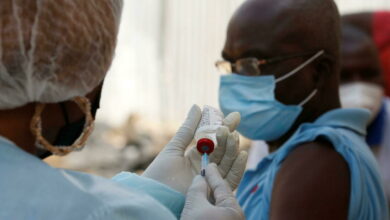
Africa CDC: Uganda’s Ebola Outbreak Still A Manageable Risk At Current Stage
Africa CDC, Africa’s top public health body, on Thursday said there is a risk that Uganda’s Ebola outbreak could spread…
Read More » -
Uganda
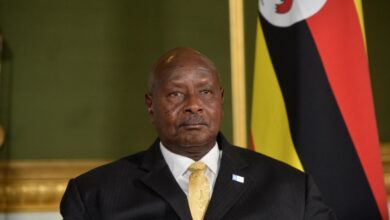
Ugandan President Announces Raft Of Measures To Control Current Ebola Outbreak
The Ugandan government on Saturday announced a raft of measures to stop the spread of Ebola in the country, reported…
Read More » -
Uganda

Ugandan Health Minister Says Capital Kampala Remains Ebola-Free Despite Death
Ugandan health authorities on Friday said the country’s capital Kampala remains Ebola-free despite a 45-year-old man dying from the virus…
Read More » -
Uganda
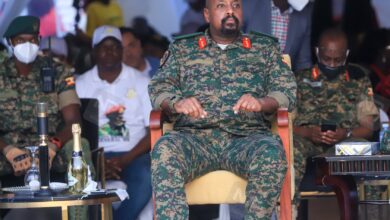
Ugandan President’s Son Asks Kenyan President To Forgive Him Over Kenya Invasion Tweets
Ugandan Ugandan President Yoweri Museveni’s son General Muhoozi Kainerugaba has apologised to Kenya’s President William Ruto over his tweets about…
Read More » -
Health
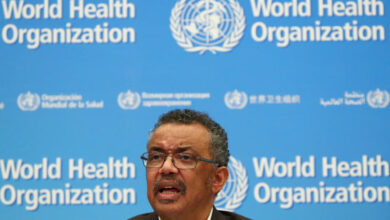
WHO Working With Uganda To Stop Spread Of Ebola In Neighboring Nations
The World Health Organization (WHO) chief on Wednesday said the organization is working with Ugandan health authorities to prevent a…
Read More » -
Uganda

Africa CDC, WHO, Uganda To Host Regional Meeting As Ebola Outbreak Spreads
The Africa Centers for Disease Control and Prevention (Africa CDC) on Thursday said Uganda will host a ministerial meeting next…
Read More » -
Uganda
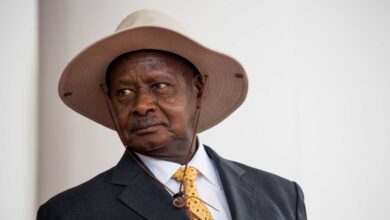
Ugandan President Museveni Apologises Kenya For Son Muhoozi Kainerugaba’s Tweet
Ugandan President Yoweri Museveni on Wednesday apologised to Kenya after his son, a senior military officer, tweeted threats to invade…
Read More » -
Health
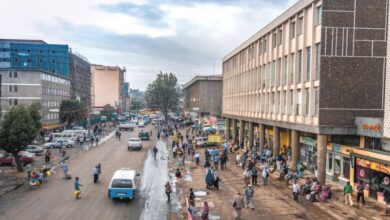
EAC Urges Countries To Bolster Defense Amid Growing Risk From Uganda’s Ebola Outbreak
The East African Community (EAC) urged its member countries to step up their defenses amid growing risks posed by the…
Read More » -
Uganda

Ugandan President Museveni Rules Out Importing Restrictions To Contain Ebola
Ugandan President Yoweri Museveni on Wednesday ruled out possibilities of imposing a lockdown to contain spread of the highly contagious…
Read More » -
Uganda

Ugandan Health Authorities Confirm Total Ebola Cases Reaches 16 As Outbreak Spreads
Ugandan health authorities on Sunday said the number of Ebola cases had jumped to 16, while a further 18 people…
Read More » -
Uganda

Uganda’s Health Ministry Reports Death Of Three More Ebola Patients In New Outbreak
Uganda’s health ministry on Friday reported three more Ebola patients have died in the country Uganda, bringing the total death…
Read More » -
Uganda

Uganda’s Health Ministry Confirms Seven Ebola Cases Amid Latest Ebola Outbreak
Uganda’s health ministry official on Thursday confirmed seven cases of Ebola including that of a 24-year-old man who died earlier…
Read More » -
Health

South Sudanese Government Increases Vigilance Along Borders With Ebola-Hit Uganda
South Sudanese government on Tuesday said it has increased vigilance along its borders following an outbreak of the Ebola-Sudan strain…
Read More » -
Health

Ugandan Health Authorities Declare Ebola Virus Disease Outbreak, Confirms One Case
The Ugandan health authorities on Tuesday declared an outbreak of Ebola after a case of the relatively rare Sudan strain…
Read More » -
Democratic Republic of the Congo
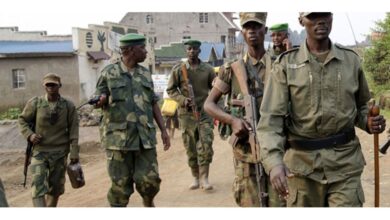
Ugandan Government Pays First Installment Of $65 Million War Reparations To DRC
The Ugandan government has reportedly paid the first instalment of $65 million to the Democratic Republic of Congo (DRC) in…
Read More » -
Uganda
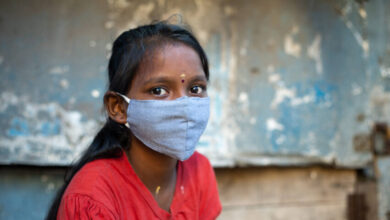
Ugandan Health Minister Says Country Likely Witnessing New COVID-19 Wave
Ugandan Health Minister Jane Ruth Aceng on Sunday said the country is likely experiencing a new wave of coronavirus as…
Read More » -
Democratic Republic of the Congo

Ugandan Government To Withdraw Soldiers Fighting ADF In DR Congo
The Ugandan government has decided to withdraw troops from neighboring Democratic Republic of Congo (DRC) in two weeks, the military…
Read More » -
Uganda

Ugandan Military Confirms President Museveni’s Son Has Not Resigned
The Ugandan military on Monday refuted reports that claimed the Commander of the Land Forces, Lt Gen Muhoozi Kainerugaba, has…
Read More » -
Democratic Republic of the Congo

ICJ Orders Uganda To Pay $325 Million To DRC In Reparations Over A Conflict Two Decades Ago
The International Court of Justice (ICJ) on Wednesday ordered Uganda to pay $325m to the Democratic Republic of the Congo…
Read More » -
Uganda

Ugandan Government Begins Administering Covid-19 Booster Shots To Priority Groups
The Ugandan government has begun administering Covid-19 vaccine booster shots to priority groups as the country reports a surge in…
Read More » -
Uganda

Ugandan Government To Destroy Over 400,000 Expired Covid-19 Vaccine Doses
The Ugandan government will destroy over 400,000 doses of expired Covid-19 vaccines at a time when less than half of…
Read More » -
Uganda
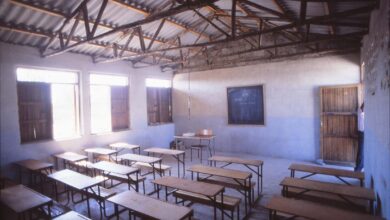
Ugandan Government Reopens Schools After Two Years As Teachers Get COVID-19 Vaccines
The Ugandan government reopened schools on Monday, ending the world’s longest school closure due to the Covid-19 pandemic, reported The…
Read More » -
Uganda
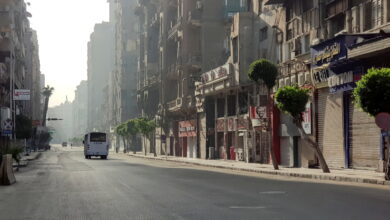
Ugandan Government Sets Tough COVID-19 Measures For Public Transport Operators
The Ugandan government on Wednesday issued an order that requires all drivers, conductors, and other crew members of public service…
Read More »

